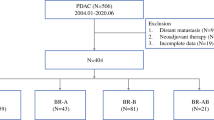Abstract
Background
Borderline resectable pancreatic cancer (BRPC) appears to be most frequently related to a positive surgical margin and has a poor prognosis after resection. However, few reports are available on differences in tumor characteristics and prognoses among resectable pancreatic cancer (PC), BRPC, and unresectable PC.
Methods
Records of 133 patients resected for pancreatic ductal adenocarcinoma and 185 patients treated as locally advanced PC (LAPC) were reviewed.
Results
Twenty-four patients who initially underwent resection (BRPC-s) and 10 patients who were initially treated as LAPC (BRPC-n) met the criteria for BRPC. Prognosis of BRPC was significantly better than that of unresectable PC, but was significantly worse than that of resectable PC. BRPC-s showed more frequent nerve plexus invasion (P < 0.01), portal vein invasion (P < 0.01), and loco-regional recurrence (P = 0.03) than resectable PC. The positive surgical margin rate was not significantly higher in BRPC-s (29%) than in resectable PC (19%) (P = 0.41).
Conclusions
BRPC had a poorer prognosis with more local failure than resectable PC although prognosis of BRPC was significantly better than that of unresectable PC. Considering the tumor and treatment characteristics, multidisciplinary treatment including resection is required for BRPC.


Similar content being viewed by others
References
Varadhachary GR, Tamm EP, Abbruzzese JL, Xiong HQ, Crane CH, Wang H, et al. Borderline resectable pancreatic cancer: definitions, management, and role of preoperative therapy. Ann Surg Oncol. 2006;13(8):1035–46.
Katz MH, Pisters PW, Evans DB, Sun CC, Lee JE, Fleming JB, et al. Borderline resectable pancreatic cancer: the importance of this emerging stage of disease. J Am Coll Surg. 2008;206(5):833–46; discussion 846–8.
Vauthey JN, Dixon E. AHPBA/SSO/SSAT Consensus Conference on Resectable and Borderline Resectable Pancreatic Cancer: rationale and overview of the conference. Ann Surg Oncol. 2009;16(7):1725–6.
National Comprehensive Cancer Network. NCCN clinical practice guidelines in oncology, pancreatic adenocarcinoma. Volume V.2.2010. Ft. Washington, PA: NCCN; 2010.
Wolff RA, Abbruzzese JL, Evans DB. Neoplasms of the exocrine pancreas. In: Kufe DW, Pollock RE, et al., editors. Holland-Frei cancer medicine, 6th edn. Hamilton, ON: BC Decker; 2003.
Kuhlmann KF, de Castro SM, Wesseling JG, ten Kate FJ, Offerhaus GJ, Busch OR, et al. Surgical treatment of pancreatic adenocarcinoma; actual survival and prognostic factors in 343 patients. Eur J Cancer. 2004;40(4):549–58.
Abrams RA, Lowy AM, O’Reilly EM, Wolff RA, Picozzi VJ, Pisters PW. Combined modality treatment of resectable and borderline resectable pancreas cancer: expert consensus statement. Ann Surg Oncol. 2009;16(7):1751–6.
Cancer IUA. UICC TNM classification of malignant tumors. New York: Wiley-Liss; 2002.
Kaplan ELMP. Nonparametric estimation from incomplete observations. J Am Stat Assoc. 1958;53:457–81.
Cox DR. Regression models and life tables (with discussion). J R Stat Soc B. 1972;34:187–220.
Chun YS, Milestone BN, Watson JC, Cohen SJ, Burtness B, Engstrom PF, et al. Defining venous involvement in borderline resectable pancreatic cancer. Ann Surg Oncol. 2010;17(11):2832–8.
Evans DB, Farnell MB, Lillemoe KD, Vollmer C Jr, Strasberg SM, Schulick RD. Surgical treatment of resectable and borderline resectable pancreas cancer: expert consensus statement. Ann Surg Oncol. 2009;16(7):1736–44.
Jamieson NB, Foulis AK, Oien KA, Going JJ, Glen P, Dickson EJ, et al. Positive mobilization margins alone do not influence survival following pancreatico-duodenectomy for pancreatic ductal adenocarcinoma. Ann Surg. 2010;251(6):1003–10.
Sohn TA, Yeo CJ, Cameron JL, Koniaris L, Kaushal S, Abrams RA, et al. Resected adenocarcinoma of the pancreas—616 patients: results, outcomes, and prognostic indicators. J Gastrointest Surg. 2000;4(6):567–79.
Neoptolemos JP, Stocken DD, Dunn JA, Almond J, Beger HG, Pederzoli P, et al. Influence of resection margins on survival for patients with pancreatic cancer treated by adjuvant chemoradiation and/or chemotherapy in the ESPAC-1 randomized controlled trial. Ann Surg. 2001;234(6):758–68.
Millikan KW, Deziel DJ, Silverstein JC, Kanjo TM, Christein JD, Doolas A, et al. Prognostic factors associated with resectable adenocarcinoma of the head of the pancreas. Am Surg. 1999;65(7):618–23; discussion 623–4.
Chang DK, Johns AL, Merrett ND, Gill AJ, Colvin EK, Scarlett CJ, et al. Margin clearance and outcome in resected pancreatic cancer. J Clin Oncol. 2009;27(17):2855–62.
Hernandez J, Mullinax J, Clark W, Toomey P, Villadolid D, Morton C, et al. Survival after pancreaticoduodenectomy is not improved by extending resections to achieve negative margins. Ann Surg. 2009;250(1):76–80.
Nagakawa T, Mori K, Nakano T, Kadoya M, Kobayashi H, Akiyama T, et al. Perineural invasion of carcinoma of the pancreas and biliary tract. Br J Surg. 1993;80(5):619–21.
Nakao A, Harada A, Nonami T, Kaneko T, Takagi H. Clinical significance of carcinoma invasion of the extrapancreatic nerve plexus in pancreatic cancer. Pancreas. 1996;12(4):357–61.
Mitsunaga S, Hasebe T, Iwasaki M, Kinoshita T, Ochiai A, Shimizu N. Important prognostic histological parameters for patients with invasive ductal carcinoma of the pancreas. Cancer Sci. 2005;96(12):858–65.
Bockman DE, Buchler M, Malfertheiner P, Beger HG. Analysis of nerves in chronic pancreatitis. Gastroenterology. 1988;94(6):1459–69.
Yi SQ, Miwa K, Ohta T, Kayahara M, Kitagawa H, Tanaka A, et al. Innervation of the pancreas from the perspective of perineural invasion of pancreatic cancer. Pancreas. 2003;27(3):225–9.
Mochizuki K, Gabata T, Kozaka K, Hattori Y, Zen Y, Kitagawa H, et al. MDCT findings of extrapancreatic nerve plexus invasion by pancreas head carcinoma: correlation with en bloc pathological specimens and diagnostic accuracy. Eur Radiol. 2010;20(7):1757–67.
Sahora K, Kuehrer I, Eisenhut A, Akan B, Koellblinger C, Goetzinger P, et al. NeoGemOx: gemcitabine and oxaliplatin as neoadjuvant treatment for locally advanced, nonmetastasized pancreatic cancer. Surgery. 2010. doi:10.1016/j.surg.2010.07.048
Landry J, Catalano PJ, Staley C, Harris W, Hoffman J, Talamonti M, et al. Randomized phase II study of gemcitabine plus radiotherapy versus gemcitabine, 5-fluorouracil, and cisplatin followed by radiotherapy and 5-fluorouracil for patients with locally advanced, potentially resectable pancreatic adenocarcinoma. J Surg Oncol. 2010;101(7):587–92.
Author information
Authors and Affiliations
Corresponding author
About this article
Cite this article
Takahashi, S., Kinoshita, T., Konishi, M. et al. Borderline resectable pancreatic cancer: rationale for multidisciplinary treatment. J Hepatobiliary Pancreat Sci 18, 567–574 (2011). https://doi.org/10.1007/s00534-011-0371-z
Published:
Issue Date:
DOI: https://doi.org/10.1007/s00534-011-0371-z




